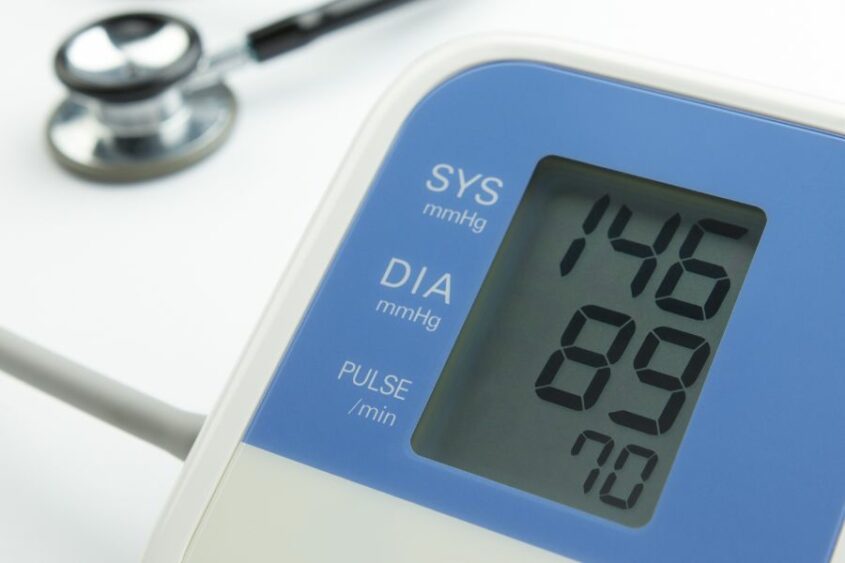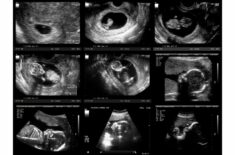What Is The Incidence Of Chronic Hypertension In Pregnancy?
A recent study published in the June 2024 issue of Hypertension journal has revealed a significant rise in chronic hypertension among pregnant women in the U.S. The incidence has doubled from 1.8% in 2008 to 3.7% in 2021. (1)(2)
Despite this sharp increase, the use of antihypertensive medication has only seen a slight uptick, from 57% to 60%. (1)(2)
The NIH (National Institutes of Health)-funded research, which studied nearly 2 million pregnancies, didn’t determine the exact reasons for the increased rates. The researchers did theorize, however, that it may be due to the following: (2)
- Rising maternal age (geriatric pregnancy)
- Increasing obesity rates
- Other unknown factors
The trends are similar to the national data of the general US adult population: the hypertension rates tend to be higher for those who are older and/or have obesity. (2)
These results are alarming because hypertension can be life-threatening, especially in pregnancy.
Hypertension during pregnancy can put extra stress on the mother’s kidneys and heart, increasing the risks for both mom and baby: (2)(3)
- Preeclampsia (high blood pressure plus protein in urine and organ damage)
- Preterm birth (unplanned delivery before 37 weeks gestation)
- Low birth weight (baby)
- Placental abruption (the placenta moves apart from the uterus before childbirth)
- Cesarean birth
It can even be fatal if undetected and left untreated. (2)
Expert Insight:
Stephanie Leonard, Ph.D., the lead study researcher and an epidemiologist at the Stanford University School of Medicine in California, explains: (2)
“These findings are deeply concerning because of the high rate of U.S. maternal mortality, which is linked to chronic hypertension in pregnancy. Despite the availability of safe and effective treatments for chronic hypertension, the study speaks to an urgent need for improvement in care for this serious condition.”
The Silent Danger
One of the most troubling aspects of hypertension is its often silent nature. Many women may not exhibit symptoms, making regular blood pressure monitoring crucial during pregnancy. (2)
What Is Hypertension?
Hypertension is another medical term for “high blood pressure,” which is determined using two numbers written with a slash (e.g., 110/80 or 120/90).
The readings are based on the systolic (number above the slash) and diastolic blood pressure (number below the slash).
The systolic number shows the blood pressure against the artery walls when your heart contracts. The diastolic number shows the blood pressure against the artery walls when your heart relaxes between the contractions. (3)
The following are the blood pressure guidelines for the readings: (3)
- Normal: Below 120/80 mm Hg
- Elevated: 120-129/<80 mm Hg (systolic between 120 and 129 mm Hg; diastolic below 80 mm Hg)
- Stage 1 hypertension: 130-139/80-89 mm Hg (systolic between 130 and 139 mm Hg; diastolic reading between 80 and 89 mm Hg)
- Stage 2 hypertension: ≥140/≥80 mm Hg (systolic at least or higher than 140 mm Hg; diastolic at least or higher than 90 mm Hg)
The above-mentioned study was done after the American College of Cardiology and the American Heart Association updated these guidelines and lowered the diagnostic threshold in 2017. Previously, stage 1 hypertension was defined as 140-159/90-109 mm Hg, and stage 2 was ≥160/≥110 mm Hg. (2)
What’s The Difference Between Hypertension & Chronic Hypertension?
“Hypertension” is simply the medical term for high blood pressure, while “chronic hypertension” in the pregnancy context can mean any of the two: (4)
- High blood pressure before you became pregnant
- High blood pressure developed during early pregnancy
Types of Hypertension in Pregnancy
Understanding the different types of hypertension is essential: (4)(5)(6)
- Chronic Hypertension: High blood pressure present before the pregnancy or developed in early pregnancy.
- Preeclampsia: High blood pressure that develops after about 20 weeks of pregnancy, accompanied by signs of damage to other organ systems.
- Gestational Hypertension: High blood pressure that develops/starts after around 20 weeks of pregnancy without other organ damage.
What Is Preeclampsia?
If you developed high blood pressure during pregnancy (around 20+ gestation weeks), it might be a sign of preeclampsia. (5)(6)
Tell-tale signs include: (5)(6)
- High blood pressure after at least 20 weeks of pregnancy (gestation weeks)
- Kidney damage or liver problems
- Proteinuria (excessive protein in urine), which can be a sign of kidney damage
- Increased liver enzymes, a possible sign of liver damage
- Vision issues (e.g., light sensitivity, blurred vision, temporary blindness, etc.)
- Upper belly pain (often under your ribs on the right side of your body)
- Nausea
- Vomiting
- Severe headaches
- Shortness of breath, a possible sign of lung damage
Pre-eclampsia can be due to several factors, with placental development considered the most common cause. (5)
Sometimes, the blood vessels don’t develop or work properly, leading to blood pressure problems and preeclampsia. (5)
It’s a serious and potentially life-threatening form of hypertension that might also lead to the following complications: (5)
- Preterm birth
- Fetal growth restrictions or low birth weight
- Placental abruption
- Other organ damage (e.g., kidneys, liver, heart, lung, or eyes)
- Stillbirth or neonatal death
Preeclampsia can also increase the risks for: (5)(6)
- Seizures
- Heart disease – affects moms
- HELLP syndrome or hemolysis elevated liver enzymes & low platelet count – affects moms and babies
- Blood clotting problems, which might lead to postpartum hemorrhage
In serious cases, preeclampsia may cause a stroke, brain injury, coma, or even maternal and/or neonatal (baby) death. (5)(7)
Currently, the only cure or treatment for preeclampsia is delivery. (7)
Preeclampsia typically goes away about a few days or weeks after delivery. Although mild preeclampsia symptoms typically stabilize within 6-8 hours after childbirth, it might take 4-6 weeks before your blood pressure returns to normal. Serious cases might last longer. (7)(9)
Surprisingly, about 0.3% to 27.5% of new moms experience postpartum preeclampsia. This condition is similar to ‘classic’ preeclampsia but develops during delivery or soon after childbirth. (10)
What Is Gestational Hypertension?
Gestational hypertension is a kind of high blood pressure problem that develops in later pregnancy (also around 20+ gestation weeks). (6)
Unlike preeclampsia, however, gestational hypertension doesn’t affect your organs. So, you can still have high blood pressure readings, but proteins won’t be detected in your urine. (6)
Although less risky than preeclampsia, gestational hypertension can still be a cause for concern. During pregnancy, your heart works harder to ensure your baby receives ample blood, oxygen, and nutrients. High blood pressure puts more strain on your heart and can also affect your baby’s nutrient, oxygen, and blood supplies. (6)
If gestational hypertension persists and is left untreated, it can progress to preeclampsia. It might also cause stillbirth or neonatal death. (6)
That’s why attending prenatal checkups and monitoring your blood pressure regularly is essential.
How Common Is Pregnancy-Induced Hypertension?
This condition affects around 6-8% of pregnant women, while chronic hypertension has a 3.7% rate (as of 2021). (1)(2)(6)
Can You Continue Taking Hypertension Medications During Pregnancy?
Yes. Experts recommend continued use of hypertensive medications to keep your blood pressure under control. However, be sure to consult your doctor and tell them about your pregnancy as soon as possible to reduce the risk of potential complications. (2)
The researchers in the 2024 Hypertension Journal study expressed concern that despite the doubled chronic hypertension rate, the medicine intake rate remains about the same (around 57%–60% of patients). (1)(2)
Dr. Leonard and the other study authors pointed out the urgent need to improve these numbers, especially because chronic hypertension in pregnancy has been linked to high maternal mortality rates. (1)(2)
Based on the study, these were the changes in oral antihypertensive medication trends over the period covered (2008 to 2021): (1)(2)
- Methyldopa – decreased from 29% to 2%
- Hydrochlorothiazide – decreased from 11% to 5%
- Labetalol – increased from 19% to 42%
- Nifedipine – increased from 9% to 17%
What Are The Risk Factors For Hypertension In Pregnancy?
- Age (younger than 20 years; older than 40)
- Diagnosis of chronic hypertension prior to pregnancy
- Preeclampsia or gestational hypertension in previous pregnancies
- Family history of hypertension
- Diabetes
- Gestational diabetes (current or previous pregnancies)
- Multiple pregnancies (e.g., twins, triplets, etc.)
- Kidney disease
- Autoimmune condition (e.g., lupus)
- Race (African-American, Alaska Native, or American Indian)
- Obesity
Tips For Managing Hypertension
Managing hypertension effectively can significantly reduce risks. Here are some tips:(6)(11)
- Regularly check your blood pressure
- Follow your doctor’s advice on antihypertensive medications.
- Maintain a healthy, low-sodium diet.
- Engage in safe physical activities recommended by your OB/GYN.(e.g., prenatal yoga).
- Avoid alcohol and smoking
- Get plenty of sleep and rest.
- Maintain a healthy weight.
What Is The 60-Second Trick To Lower Blood Pressure?
Stress and anxiety can increase blood pressure. Taking deep breaths for 60 seconds can slow your heart rate and increase relaxation. (12)
Here are the Japanese Society of Hypertension recommendations: (13)
- Find a quiet, comfortable place. Set the timer for 30 seconds.
- Close your eyes.
- Sit up straight.
- Take a deep breath through your nose, then release it through your mouth. Count to 5 seconds for each breath.
- Repeat five more times.
Consider doing the 30-second breathing exercise at least once daily to help reduce your blood pressure. (13)
You can also read our article on how Sukha Pranayama or “easy breath” can have immediate positive effects on your high blood pressure.
Our Recommendations: Digital Blood Pressure Monitors
- OMRON Bronze Blood Pressure Monitor
- iHealth Track Smart Upper Arm Blood Pressure Monitor (Wide Range Cuff)
- Braun ExactFit 3 Blood Pressure Monitor
- Withings BPM Connect – Digital Blood Pressure Cuff & Heart Rate Monitor
References
(1) https://www.ahajournals.org/doi/10.1161/HYPERTENSIONAHA.124.22731
(2) https://www.nih.gov/news-events/news-releases/chronic-hypertension-pregnancy-doubled-us-2007-2021
(3) https://www.acog.org/womens-health/faqs/preeclampsia-and-high-blood-pressure-during-pregnancy
(4) https://www.mfmnyc.com/blog/what-is-chronic-hypertension/
(5) https://www.mayoclinic.org/diseases-conditions/preeclampsia/symptoms-causes/syc-20355745#
(6) https://my.clevelandclinic.org/health/diseases/4497-gestational-hypertension
(7) https://my.clevelandclinic.org/health/diseases/17952-preeclampsia
(8) https://ukhealthcare.uky.edu/wellness-community/health-information/short-long-term-effects-preterm-birth
(9) https://www.cedars-sinai.org/health-library/diseases-and-conditions/p/preeclampsia-and-eclampsia.html
(10) https://www.researchgate.net/publication/303799320_Postpartum_Preeclampsia
(11) https://www.nhs.uk/start-for-life/pregnancy/smoking-and-alcohol-during-pregnancy/
(12) https://www.medicinenet.com/how_to_lower_my_blood_pressure_immediately/article.htm
(13) https://www.drugs.com/medical-answers/fastest-lower-blood-pressure-safely-3563534/












